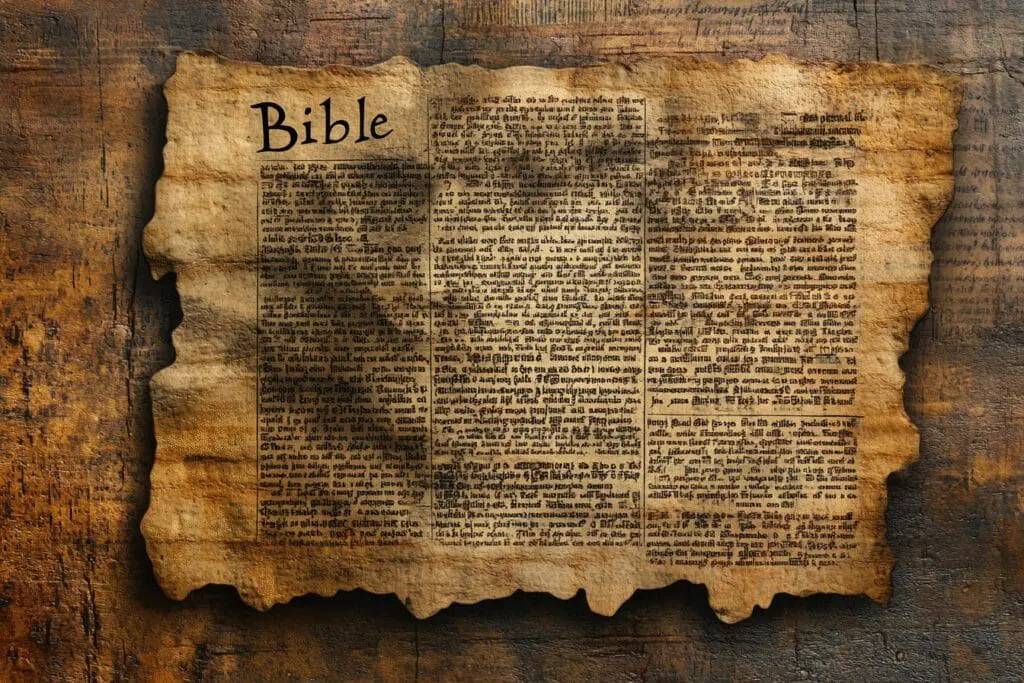Have you ever stopped to think about the word “Bible”? I mean really think about it. For many of us, it’s a word we’ve known our entire lives. It’s a source of comfort, guidance, and profound truth. I still remember the feel of my first Bible, the thin pages and the weight of it in my hands. It felt important long before I understood everything inside it. But it wasn’t until much later that I asked myself a simple question: Where did the word Bible come from?
The answer is not just a simple definition; it’s a fascinating journey through ancient cities, languages, and the very history of how God’s Word was passed down to us.
The story of this word travels across thousands of years. It starts in an ancient port city, involves a grassy plant, and is shaped by scholars translating sacred texts. Understanding its origin has deepened my appreciation for the book I hold so dear. It reminds me that the Bible is not just a single book that dropped from the sky. Instead, it is a divinely inspired library, a collection of books, carefully preserved and passed through generations and across cultures, all to bring us the truth of God’s love.
More in Bible Category
What Is the Shortest Verse in the Bible
What Is the Shortest Book in the Bible
What Is the Most Used Word in the Bible
Key Takeaways
- The Root Is Greek: The English word “Bible” ultimately comes from the Greek word biblia, which means “books.”
- A City and a Plant: The Greek word itself is traced back to byblos, the name for the papyrus reed used to make ancient “paper.” This plant was heavily exported from the Phoenician port city of Byblos.
- From “Books” to “The Book”: Originally, biblia was a plural word, emphasizing that the Bible is a collection of many books. Over time, through Latin, the word came to be treated as a singular noun, “The Book,” reflecting its unified divine message.
- The Word “Bible” Isn’t in the Bible: The authors of the scriptures did not use the word “Bible” to refer to the texts. They used terms like “the Scriptures” or “the Law and the Prophets.” The name “Bible” was applied much later.
What Was the Original Greek Word for Bible?
To find the origin of the word “Bible,” we have to travel back in time to the world of ancient Greece. The journey begins with a word you may not be familiar with: βύβλος (byblos).
In ancient Greek, byblos was the word for the papyrus reed. This humble plant, which grew abundantly along the Nile River in Egypt, was incredibly important. Ancient civilizations harvested it to create one of the earliest and most popular writing materials in the world. They would peel the reed, lay its strips in a grid pattern, press them together, and let them dry into a sheet. This material was also called papyrus.
Because it was lightweight and relatively easy to produce, papyrus became the go-to material for documents, letters, and, most importantly, scrolls. These scrolls were, in essence, the books of the ancient world.
So, How Did a Plant’s Name Become Associated with a Holy Book?
The connection becomes clear when we look at ancient trade routes. The Phoenician coastal city of Gebal was a major hub for the papyrus trade. The Greeks, who were major importers of Egyptian papyrus, got so much of their supply through this city that they began to call the city Byblos.
The city’s name became synonymous with the product it exported. Soon, the word byblos evolved. It didn’t just refer to the papyrus reed anymore. It came to mean a papyrus scroll, and eventually, any kind of book.
From this single word, byblos, the Greeks derived a new word: βιβλίον (biblion). This was a more common term for “scroll” or “book.” It’s from here that we get much closer to our modern word.
How Did the Word Evolve From ‘Biblos’ to ‘Biblia’?
The next step in the journey of this word is a simple but powerful grammatical shift. When Greek speakers wanted to talk about more than one book or scroll, they used the plural form of biblion, which is τὰ βιβλία (ta biblia).
Translated literally, ta biblia means “the books.”
This is a crucial point in understanding the Bible’s origins. When the earliest Greek-speaking Christians referred to the collected sacred writings—the Old Testament (what they called the Septuagint) and the new letters and gospels from the apostles—they didn’t see it as a single volume. They saw it as a collection of individual, divinely inspired works.
They were talking about:
- The books of Moses (Genesis, Exodus, Leviticus, etc.)
- The books of the prophets (Isaiah, Jeremiah, etc.)
- The Psalms and other writings.
- The Gospels (Matthew, Mark, Luke, John)
- The letters of Paul, Peter, and other apostles.
So, when they said ta biblia, they were referring to “the books” that made up their sacred library. The name itself reflected the beautiful reality of the scriptures: a collection of diverse writings—history, poetry, prophecy, letters—all telling one unified story of God’s redemption plan.
How Did Latin Influence the Word’s Meaning?
As Christianity spread across the Roman Empire, Latin became the dominant language of the church in the West. Translators and scholars began to render the Greek scriptures into Latin. When they encountered the Greek phrase ta biblia, they adopted it directly into Latin as biblia.
However, something fascinating happened in the transition.
In Greek, biblia was a neuter plural noun. But in Latin, biblia looked and sounded like a feminine singular noun. Over many years of usage, Latin speakers began to treat it as such.
This was a monumental shift. “The books” (plural) slowly became “The Book” (singular).
This change in language mirrored a change in theological understanding. While the Bible is indeed composed of many individual books, Christians firmly believe they form a single, coherent, and unified message from God. The grammatical shift from plural to singular perfectly captures this idea. The word itself came to reflect the unity of the Old and New Testaments as one divine revelation.
What Did People Call the Bible Before It Was Called the Bible?
This is a fantastic question because it gets to the heart of how the earliest followers of Jesus viewed their holy texts. The word “Bible” wasn’t used during the time of the apostles, and certainly not during Jesus’s earthly ministry. So, what terms did they use?
When Jesus or the apostles referred to the Old Testament, they used several different phrases that would have been familiar to their Jewish audience.
Here are some of the most common terms they used:
- The Scriptures: This is perhaps the most common term. For example, in John 5:39, Jesus says, “You search the Scriptures because you think that in them you have eternal life; and it is they that bear witness about me.” The Greek word here is graphē, which simply means “the writing.”
- The Sacred Writings: Paul uses this phrase when writing to Timothy. In 2 Timothy 3:15, he mentions that from childhood Timothy has “known the sacred writings, which are able to make you wise for salvation through faith in Christ Jesus.”
- The Law and the Prophets: This was a common way to refer to the entire corpus of the Hebrew scriptures. It encompasses the Torah (the Law of Moses) and the books of the prophets. Jesus uses this phrasing in Matthew 7:12: “So whatever you wish that others would do to you, do also to them, for this is the Law and the Prophets.”
- The Law of Moses, the Prophets, and the Psalms: In Luke 24:44, the resurrected Jesus gives a more detailed description, showing the three-part division of the Hebrew canon: “These are my words that I spoke to you while I was still with you, that everything written about me in the Law of Moses and the Prophets and the Psalms must be fulfilled.”
These phrases show that the first Christians had a deep reverence for these texts. They saw them as divinely authoritative and central to understanding who Jesus was and what He came to do.
Does the Word ‘Bible’ Appear Anywhere in the Bible Itself?
Given its journey through Greek and Latin, it might not be a surprise to learn that the word “Bible” does not appear anywhere in the text of the Bible itself.
This makes perfect sense when you think about it. The books that make up the Bible were written over a period of roughly 1,500 years by many different authors. The concept of collecting all these specific books into a single, recognized canon called “The Bible” didn’t fully solidify until centuries after the last book was written.
The authors of these texts saw themselves as recording history, writing prophecy, or penning letters to churches. They had no concept that their work would one day be part of a larger collection known as “The Bible.” It was the early church, guided by the Holy Spirit, that recognized these specific writings as inspired and compiled them into the collection we have today.
How Did the Word Enter the English Language?
The word’s journey wasn’t over after it was adopted into Latin. Its final stop was the English language.
The Latin word biblia made its way into Old French as bible. From there, it was a short jump into Middle English. The word has been part of the English language for over 700 years.
Its usage became widespread with the first complete English translations of the scriptures. John Wycliffe’s English Bible in the late 14th century was a landmark moment. For the first time, ordinary people in England could potentially have access to the full scriptures in their own tongue, and they called it “the Bible.”
Centuries later, the invention of the printing press and the work of translators like William Tyndale and the team behind the King James Version would solidify the word “Bible” in the English-speaking world forever.
What Does the Etymology of ‘Bible’ Teach Us Today?
Looking back at this long journey, I am struck by how much this simple word’s history reflects the nature of the book it describes.
It started with a city, Byblos, reminding us that God works through real people in real places in history. The story isn’t a myth; it’s grounded in our world. For more on the history of Byblos and its connection to writing, you can explore resources like the World History Encyclopedia. This shows how intertwined our faith’s story is with human history.
The word came from a plant, the papyrus reed, a fragile, common thing. Yet on this material, the most powerful words ever written were preserved. It shows how God uses the ordinary to accomplish the extraordinary.
Then, the name became biblia, “the books.” This reminds us of the rich diversity within the Bible. We have 66 distinct books, written in different styles, by different authors, over centuries. It’s a library, not a monologue.
Finally, it became “The Bible,” a singular name. This speaks to the incredible unity of its message. From Genesis to Revelation, from the garden to the city of God, it tells one seamless story of creation, fall, redemption, and restoration, all pointing to Jesus Christ.
The next time you pick up your Bible, take a moment to remember the journey its name has taken. It’s a story of preservation and purpose. It’s a testament to the fact that for thousands of years, God has been faithfully delivering His Word to His people, a collection of books that is truly The Book for all humanity.
Frequently Asked Questions – Where Did the Word Bible Come From

How is the word ‘Bible’ used today beyond religious contexts?
Today, the word ‘Bible’ is used metaphorically to refer to any authoritative guide or source of trusted information, such as a ‘gardening Bible’ or a ‘style Bible.’ This usage reflects the idea of the Bible as the ultimate reference, a tradition that stems from its historical significance as a comprehensive and authoritative collection of texts.
What led to the change from the plural ‘biblia’ to the singular ‘Bible’ in Latin?
In Latin, ‘biblia’ was originally plural, meaning ‘the books.’ However, Latin speakers mistakenly treated it as singular, akin to words ending in ‘-a’ for one thing, leading to the singular form ‘Biblia.’ This grammatical change helped the concept of multiple scrolls become one single book, which reinforced the idea of the Bible as a unified text.
Why did the Greek term ‘ta biblia’ become associated with sacred texts?
Initially, ‘ta biblia’ simply referred to scrolls or books. Over time, as Jewish and Christian texts were written and collected, the Greeks started calling all their sacred writings ‘ta biblia,’ which then came to signify the entire collection of the Bible. This transition marked the shift from a general term for writings to a specific name for the Holy Scriptures.
How did the city of Byblos influence the word ‘Bible’?
Byblos, an ancient port city in Phoenicia (modern-day Lebanon), played a crucial role because it was a center of the papyrus trade, which was used for writing. The Greeks named the paper from this city ‘byblos,’ and the collection of scrolls made from papyrus was called ‘ta biblia,’ meaning ‘the books.’ This connection between the city and the materials used for writing influenced the later term for sacred scriptures.




